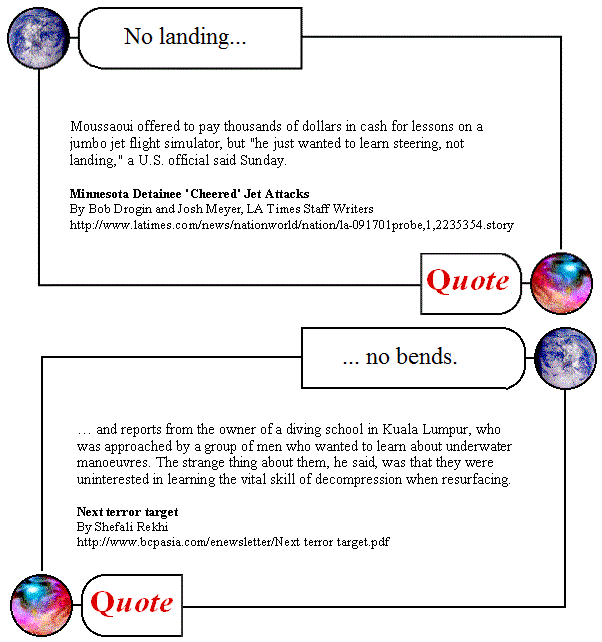Archive for the ‘piracy’ Category
Towards a Pattern Language for CT? III
Tuesday, May 17th, 2011[ by Charles Cameron — all middle and no end ]
.
And while I’m at it, I might as well post one of the very first DoubleQuotes I put together when I was first experimenting with the format, sometime between October 2003 and June 2004
I thought then, and I think now, that a walkway lined with dozens of little plaques presenting odd snippets of fact like either one of those would be a marvelous device for triggering associations in ambulatory analysts…
And it is a recurring pattern, isn’t it?
Ominously, there have been cases of terrorist pirates hijacking tankers in order to practice steering them through straits and crowded sea-lanes-the maritime equivalent of the September 11 hijackers’ training in Florida flight schools. These apparent kamikazes-in-training have questioned crews on how to operate ships but have shown little interest in how to dock them. In March 2003, an Indonesian chemical tanker, the Dewi Madrim, was hijacked off Indonesia. The ten armed men who seized the vessel steered it for an hour through the busy Strait of Malacca and then left the ship with equipment and technical documents.
.
Gal Luft and Anne Korin, Terrorism Goes to Sea, Foreign Affairs, Nov/Dec 2004
It helps to be alert to rhyming between ideas…
New Journal of Asymmetric Warfare
Wednesday, April 23rd, 2008Dynamics of Asymmetric Conflict. Hat tip to Selil.
Friday, September 7th, 2007
RARE RETREAD: BLACK GLOBALIZATION AND SMALL WARS
Very seldom do I ever lift something from the archives, but I came across a guest-post I did a number of years ago for blogfriend Josh Manchester at his now defunct The Adventures of Chester blog. The basic content of the post has held up fairly well, though some of the original links that supported the data have since vanished ( reminding me that links are really, really, transient but a footnote is forever); most of the economic data came from NIC/CIA.gov PDFs that have been moved or removed from the web, so take that for what it is worth (the dollar figures are more than stale now, regardless):
“BLACK GLOBALIZATION AND SMALL WARS
When Saddam Hussein emptied his prisons prior to the Iraq War it seemed at the time a sign of his regime’s impending doom. Either Saddam’s amnesty was an act of desperation to shore up support among the Iraqi people or his grip on power had so weakened that he had lost control even over elements of his own security apparatus. In actuality, the dictator had made a preemptive asymmetrical strike against American forces by releasing Iraq’s professional criminals whose well-organized networks badly undermined the CPA and today are connecting an otherwise heterogeneous insurgency. Although this move ultimately did Saddam Hussein little good it demonstrated the potential power that “Black Globalization” has to effect the outcome of military interventions, even those of the United States.
It’s rather strange that given our history, American intelligence did not forsee this outcome in Iraq. It was the United States government that used the Mafia of Charles “ Lucky” Luciano to gather naval intelligence, suppress sabotage on the dockyards and enlist the Sicilian Mafia to undermine Mussolini’s rule to soften the island for Allied invasion. WWII however was the age when nation-state control and the exercise of sovereignty and economic autarky were at their zenith and non-state actors like criminal syndicates were peripheral to events.
Today, the strategic situation is vastly different. The relative primacy of nation-state sovereigns has been eroded by globalization that opened their economies and borders to greater flows of “connectivity” and challenges to their political legitimacy mounted by international, transnational and subnational actors. Some of these, the WTO or the internet for example, at least have brought tremendous benefits. Not so the metastasis of transnational criminal networks that constitute black globalization and have an economic reach that in the aggregate, rivals the greatest of regional powers and are centered on a few geographic nexus points. A sampling of annual estimates:
Governmental Corruption $ 500 billion
Global Narcotics trafficking $ 400-500 billion (matching or exceeding U.S. Defense budget)
Conflict Diamond trafficking $ 24 billion/ 10 % world market
Human Trafficking $ 7 billion
Stolen Automobile Smuggling $ 9 billion
Piracy ( maritime) $ 16 billion ( high end estimate)
Even leaving aside minor or hard to estimate contraband markets or legal “ gray “ markets like international arms dealing, these revenues are enough to field armies or acquire the most expensive technology to evade capture or launch asymmetrical attacks on state forces.
Clearly, the days when even a weak state ruler like Ngo Dinh Diem could scattter a criminal organization with a whiff of grapeshot are over. Expeditions into failed Gap states like Somalia or major military invasions of countries like Iraq must take Black Globalization networks into account during strategic planning as they would subnational or even full-fledged state actors. In terms of on the ground, policy, options for U.S. policy makers and commanders for engaging these networks would include:
Alliance ( Luciano Model)
Benign Neutrality ( Transactional Model)
Armed Neutrality ( Deterrence Model)
Active Containment ( Limited military action)
Belligerence (Counterinsurgency model)
Ideally, the U.S. would seek to prevent the Black Globalization network from actively aligning itself with the enemy and avoid direct engagement to suppress the network until the primary mission was accomplished. Imagine the state of Iraq today if the criminal networks were working hand in glove with American and Iraqi troops to root out the insurgency instead to aid the insurgents against coalition forces. Circumstances, however may not always prove to be so simple, corrupt and violent networks being what they are, any negotiated result is at best transient.
A second indirect form of pressure could be exerted on the money laundering aspect of Black Globalization which must at some point attempt to “ clean” their cash flow through or by acquiring legitimate banks and financial markets in Western countries. Strategic financial attack was evidently taken against the major backers of Slobodon Milosevic during the Kosovo War with positive results. Exploiting this avenue might require that the Marines have more than just a few good accountants, a genuine financial intelligence service would be required to maximize effectiveness.
The complexity of small wars is almost enough to make diplomats and generals long for the good, old days of the Warsaw Pact. Almost. “
Sunday, June 10th, 2007
THERE’S A FINE LINE BETWEEN AN ACT OF PIRACY AND JUST SIMPLY TAKING SOME INITIATIVE

A fascinating economics paper sent to me by Fabius Maximus (hat tip accorded) that took me a few days to get to reading. Wish I had looked at it earlier:
“An-arrgh-chy: The Law and economics of Pirate Organizations” (PDF) by Dr. Peter T. Leeson
Peterson argues that historical pirates, far from being Hobbesian outlaws, governed themselves with rule-sets that minimized conflict and maximized cooperation and profit ( albeit at the expense of civilized seafaring states). Looking at broad principles of functionality, Leeson’s work is applicable to other violent non-state actors – Latin American drug cartels, 4GW insurgencies and terror networks, warlord and sectarian militias, Bunker’s 3 Gen gangs, TOC groups like Chinese Triads and Russian mafiya and so on.
This argument struck a chord with me on two points. First, it mirrors the historical experience of traditional Russian banditry where robber chieftains ruled over there fellows according to “Thieves Law”, something Solzhenitsyn discusses at length in The Gulag Archipelago.
Secondly, network theory research indicates that small systems that seem chaotic or “noisy” actually develop emergent rule-sets that bring the system into an orderly pattern, even if the rules and patterns are very simple ones. A pirate ship, even a fleet, much like a terrorist network, is simply a small, complex, social network. Rules accepted on a consensual basis cut down on ” noise” and allow the network to become more efficient.
A must read.




